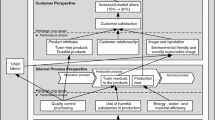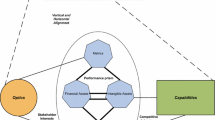Abstract
The European Corporate Sustainability Framework (ECSF) is, among other concepts, based on a phase-wise development approach as described by Clare Graves' Levels of Existence Theory. As much as corporate sustainability has a sequence of adequate interpretations, aligned with each development level, also the notion of business excellence can be defined at multiple levels, as this paper demonstrates. Furthermore, the authors analyze the current EFQM Excellence Model for particular biases towards various development levels and suggest a new and innovative two-step approach to assessing organizational performance with respect to organizational excellence (OE) and corporate sustainability. According to the organization's ambition, the assessment is either limited to a shareholder approach, mainly focusing at optimal usage of resources, or it also includes an additional assessment format based on the stakeholder approach, with specific reference to the organization's performance on the financial, social and ecological bottom line. This paper demonstrates the need and feasibility of an EFQM-Based assessment tool with a combined focus on corporate sustainability and OE.
Similar content being viewed by others
References
Beck, D. and C. Cowan: 1996, Spiral Dynamic; Mastering Values, Leadership and Change (Blackwell Publishers ltd., Cornwall).
Cameron, K. S and R. Quinn: 1999, Diagnosing and Changing Organizational Culture: Based on the Competing Values Framework (Addison Wesley, Reading, MA).
Collins, J. C. and J. I. Porras: 1994, Built to Last. Successful Habits of Visionary Companies (Century, London).
Collins, J. C.: 2001, Good to Great; Why Some Companies Make the Leap and other don't (Harper Business, New York).
EKOS International: 2000, EKOS Sustainability Quotient.
ERBS BV/Erasmus University, 2001, Excelleren in de weerbarstige praktijk: Knelpuntenonderzoek toepassing INK-managementmodel.
Gutierrez, A. and K. Lamoureux: 2003, Rapid Assessment for Sustainable Tourism Development (Conservation International and George Washington University, Washington D.C.)
Graves C. (1974) Human Nature Prepares for a Momentous Leap, The Futurist Magazine, April 1974, pp. 72–87.
Greenleaf, R: 1973, The Servant as Leader? (Newton Center, MA).
Hes, F. and T. W. Hardjono: 1993, De Nederlandse Kwaliteitsprijs en Onderscheiding (Kluwer, Deventer).
Jaworski, J: 1996, Synchronicity, the Inner Path of Leadership (Barrett-Koehler Publishers, San Francisco).
Mohanty, N. K. and S. Ray: 2002, Corporate Environmental Sustainability Index (National Institute of Environmental Engineering and Indira Gandhi Institute of Development Research, Mumbai India).
Pirsig, R. M: 1991, Lila, an Inquiry into Morals (Bantam Books, Toronto).
Simons, R.: 1995, Levers of Control: How Managers use Innovative Control Systems to Drive Strategic Renewal (Harvard Business School Press, Boston).
van Marrewijk, M: 2003, 'Concepts and Definitions of Corporate Sustainability', Journal of Business Ethics 44(2), 95–105.
van Marrewijk, M and M. Were 2003, Multiple Levels of Corporate Sustainability, Journal of Business Ethics 44(2– 3), 107–119.
van Marrewijk, M. and T. W. Hardjono: 2003, 'European Corporate Sustainability Framework for Managing Complexity and Corporate Change' Journal of Business Ethics, 44(2 and 3), 121–132.
van Marrewijk, M. and J. Timmers: 2003, 'Human Capital Management' Journal of Business Ethics 44(2 and 3), 171–184.
van Marrewijk, M: 2004, 'The Social Dimension of Organizations: Recent experiences with Great Place to Workê assessment practices', Journal of Business Ethics (Forthcoming).
van Marrewijk, M: 2004, 'A Value Based Approach to Organization Types: Towards a Coherent set of Stakeholder-Oriented Management tools', Journal of Business Ethics (Forthcoming).
van Marrewijk, M: and H. M. Becker: 2004, 'The Hidden Hand of Cultural Governance: The Transformation Process of Humanitas a Care-driven Organization Providing Cure, Care, Housing and Well-being to Elderly People', Journal of Business Ethics Forthcoming.
Weick, K. E. and K. M. Sutcliffe: 2001, Managing the Unexpected (Jossey-Bass, San-Fransisco).
Wilber, K.: 2000, A Theory of Everything: An Integral Vision for Business, Politics, Science and Spirituality, (Shambhala, Boston).
Wilber, K.: 1995, Sex, Ecology, Spirituality: The Spirit of Evolution (Shambhala, Boston).
Rights and permissions
About this article
Cite this article
Marrewijk, M.V., Wuisman, I., Cleyn, W.D. et al. A Phase-wise Development Approach to Business Excellence: Towards an Innovative, Stakeholder-oriented Assessment Tool for Organizational Excellence and CSR. Journal of Business Ethics 55, 83–98 (2004). https://doi.org/10.1007/s10551-004-2154-9
Issue Date:
DOI: https://doi.org/10.1007/s10551-004-2154-9




